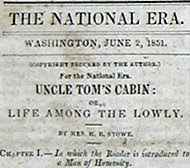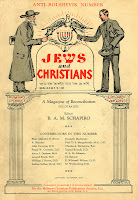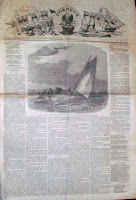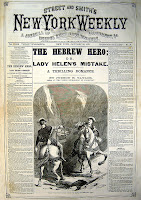Steven Lomazow: Racism in American Magazines
[Steven Lomazow, M.D. is a New Jersey neurologist and for over three decades he has been an avid collector of American ephemera.]
This was not always the case. It was quite acceptable in times past, the not so far past, to regularly publish images that today would do more then raise eyebrows. As the offspring of a holocaust survivor, it is most logical for me to address the issue of racism from the standpoint of anti-semitism.
In the mid and early 19th century, Catholics and the pope were frequent targets. Prior to reconstruction, there was not too much in the way of anti african-american images or writing. After 1880 or so, the lid came off on all sorts of imagery that was, by today's standards, 10 out of 10 offensive. People like Richard K. Fox, publisher of tabloids such as Police Gazette, made no bones about his hatred for African Americans and Jews. E.C.Z. Judson (aka Ned Buntline) was an influential publisher, best remembered for"inventing" Buffalo Bill. He was also a supporter of the visciously racist"Know Nothing" party of the 1850's. Many of the humor magazines like Truth and Judge regularly featured racial parody. Probably the worst of all was JudgesLibrary, an offshoot of Judge whose monthly issues were often wholly devoted to one or another minority group, full of the most offensive jokes and cartoons imaginable. No group was spared, Jews, Italians, Irish and African Americans were regularly portrayed in a most offensive light, obviously appealing to the basest elements of American society and fueling prejudice and bigotry for many future generations.
Things calmed down a bit after 1920 or so, but subtle and, at times, not so subtle, writing continued. Major publishers, like H.L. Mencken, did little to hide their anti-semitic views and, of course, Henry Ford's Dearborn Independent was little more than a rag to promote Ford's rabidly anti-semitic views about"The Protocols of Zion" and the jewish plan of economic dominance of international business, (while Hitler was still sitting in prison in the early 1920's writing"Mein Kampf", Ford was actively and widely spewing anti-semitic diatribe for all to see. If present-day Jews read more history, they'd be more likely to drive German cars before Fords). Ford himself became the brunt of parody in this cartoon by George Grosz published in the October 1932 issue of the satirical monthly, Americana.
Read http://en.wikipedia.org/wiki/Henry_Ford in particular the section on The Dearborn Independent, for further information on how Ford's views on Judiasm inspired and abetted Hitler.
We've come a long way. This has been a pretty good year in getting us to a higher understanding. God Bless America, and all that she stands for.
Read entire article at http://magazinehistory.blogspot.com
I read today that the mayor of Los Alamedos, California resigned after sending a tasteless and inappropriate image in an e-mail to his friends and supporters. Of course, this immediately raised the issue in my"magazine history" mind of racism in America as reflected in its periodicals.
The present-day world is quick to respond to offensive images vis a vis the recent New York Post monkey satire and the one of the Danish cartoonist a few years ago that literally sparked a jihad in the muslim world.
This was not always the case. It was quite acceptable in times past, the not so far past, to regularly publish images that today would do more then raise eyebrows. As the offspring of a holocaust survivor, it is most logical for me to address the issue of racism from the standpoint of anti-semitism.
In the mid and early 19th century, Catholics and the pope were frequent targets. Prior to reconstruction, there was not too much in the way of anti african-american images or writing. After 1880 or so, the lid came off on all sorts of imagery that was, by today's standards, 10 out of 10 offensive. People like Richard K. Fox, publisher of tabloids such as Police Gazette, made no bones about his hatred for African Americans and Jews. E.C.Z. Judson (aka Ned Buntline) was an influential publisher, best remembered for"inventing" Buffalo Bill. He was also a supporter of the visciously racist"Know Nothing" party of the 1850's. Many of the humor magazines like Truth and Judge regularly featured racial parody. Probably the worst of all was JudgesLibrary, an offshoot of Judge whose monthly issues were often wholly devoted to one or another minority group, full of the most offensive jokes and cartoons imaginable. No group was spared, Jews, Italians, Irish and African Americans were regularly portrayed in a most offensive light, obviously appealing to the basest elements of American society and fueling prejudice and bigotry for many future generations.
Things calmed down a bit after 1920 or so, but subtle and, at times, not so subtle, writing continued. Major publishers, like H.L. Mencken, did little to hide their anti-semitic views and, of course, Henry Ford's Dearborn Independent was little more than a rag to promote Ford's rabidly anti-semitic views about"The Protocols of Zion" and the jewish plan of economic dominance of international business, (while Hitler was still sitting in prison in the early 1920's writing"Mein Kampf", Ford was actively and widely spewing anti-semitic diatribe for all to see. If present-day Jews read more history, they'd be more likely to drive German cars before Fords). Ford himself became the brunt of parody in this cartoon by George Grosz published in the October 1932 issue of the satirical monthly, Americana.
Read http://en.wikipedia.org/wiki/Henry_Ford in particular the section on The Dearborn Independent, for further information on how Ford's views on Judiasm inspired and abetted Hitler.
Fortunately,"the dark side of the force" did not ultimately prevail and we have evolved, though not yet perfectly, to a better understanding of the benefits of a heterogenous society.
Publications like John Greenleaf Whittier's National Era first published Harriet Beecher Stowe's"Uncle Tom's Cabin" that did a lot to stoke the fires of the Civil War and emancipation. The body of more tolerant journalism ultimately far exceeded the bad.
Publications like John Greenleaf Whittier's National Era first published Harriet Beecher Stowe's"Uncle Tom's Cabin" that did a lot to stoke the fires of the Civil War and emancipation. The body of more tolerant journalism ultimately far exceeded the bad.
The first magazine published by a Jew in America, The Jew, was actually published in defense of the proselytism of another, Israel's Advocate. Even in 1913, this practice continued.
The caption on the illustration of this Civil War era issue of Forney's War Press is not so subtly anti-semitic.
The amazing anomaly of a Jewish heroic character,"The Hebrew Hero" appeared in Street and Smith's New York Weekly at a time when the vast majority of sentiment was of the opposite viewpoint.
We've come a long way. This has been a pretty good year in getting us to a higher understanding. God Bless America, and all that she stands for.








